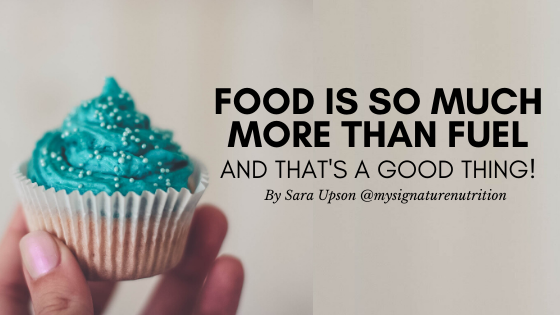Food Is So Much More Than Fuel.
April 20th, 2020 by Sara Upson

“I want to eat to live, not live to eat” is a statement I hear so often from new clients. And while on the surface that might seem like a good thing- it’s 100% diet culture. Food is so much more than just fuel for your body. Yes, food provides sustenance and nourishment, but food is also joy, pleasure, connection, memories and so many other just as important purposes.
Diet culture boils food down to macros, points, calories in versus out and that’s about it. It leaves little room for pleasure, fun, or memories. The thing is, even if that space isn’t allowed- it’s still there.
Food is so much more than fuel. One of the strongest memory associations we have is through smell and taste. The senses are powerful at connecting your brain with your body and your brain “wires together” taste and smell memories- particularly if they’re strong positive or negative. (Like that time you got the stomach bug after eating Cheetos or the holiday cookies your grandma makes.)
Because of the powerful brain connection between taste (although a lot more is related to smell) and memories, food becomes associated with certain events, feelings, people, places or other association. These connections are wired automatically and are there whether you’re aware of them or not. The emotions and memories associated with certain foods can often be the reason why you choose the foods you choose. These connections make eating inherently emotional.
It’s these connections that often drive comfort eating or emotional eating. And that’s not a bad thing. The reality is, we all emotionally eat, and thank goodness we do. How boring and lifeless would it be to not have special foods at holidays, celebrations, births, deaths, cultural events, or in life in general. It’s often food at these events that helps provide tradition, memories, and joy.

When you’re aware of these connections with food they can be a powerful tool to communicate what it is that you’re really desiring. For example, in the midst of quarantine for COVID-19 I’ve found myself craving some specific foods- homemade blueberry ice cream, fudge brownie sundae, baked beans are a few that come to mind quickly. AS I’ve noticed these cravings a pattern I’ve noticed is that they’re all associated with childhood and with very carefree, pleasurable memories. It makes sense that I’d crave foods associated with safety, pleasure and a carefree time during a time of intense stress and uncertainty.
The food you’re craving isn’t random. During this time of COVID-19- or other stressful times, have you noticed a pattern to your food cravings? Do you crave the same foods over and over? Are you craving a bunch of seemingly random things? If so, know that it’s not random- there’s intent and purpose here. Why? The attempt is to try and get your body and brain what it needs- which at a stressful time is nourishment AND peace, love, connection, safety, comfort, pleasure, happiness.
To check in with these cravings and food connections ask yourself these questions: when I think of this food what comes to mind? What is your strongest memory of eating that food? What is your first memory of eating that food? Even how you describe the food can have insight into what it is you’re really desiring. Perhaps you can get it through the food, perhaps what you need isn’t in the food. Either way, it’s okay and it’s okay to eat the food.
It’s okay to eat emotionally. The reality is we all eat with emotion whether we know we do it or not. Emotional eating is not problematic. It’s actually smart and resourceful. A way to help fulfill your needs and express what you’re feeling and seek comfort. Pretty brilliant.

Diet culture is judgmental of emotional though, and you may feel guilty about it because it feels out of control, like you shouldn’t do it or that it’s a bad thing. But it’s not bad. Yes, it can become problematic if it’s the only skillset that you have or if it feels out of control. If emotional eating feels problematic for you- I hope that you’ll consider how it’s also a coping skill and your attempt to find a way to relieve whatever it is that’s really bothering you. It feels like it’s all about the food, but it’s not. Food is part of it, and the food can actually help you both emotionally in the moment- and with figuring out what you really need. Eating with emotion is a powerful tool.
The good news is that food is supposed to be more than fuel. Food is also supposed to provide pleasure and satisfaction and comfort and so much more!
Try this activity to learn more about your food connections:
Write about your most pleasurable food experiences here. No judgment, just quick jot down some pleasurable or enjoyable food or eating experiences. Write what you had, who you were with, when it was, how you felt.
Now consider- do you often find yourself craving those foods? It would be normal if you did. When you’re craving those foods, it may be just the food, or it could also be the people who were there, how you felt, or the emotions you had.
Once you discover these associations, the next question becomes, does the food fulfill that need? If yes, great! If no, then consider- what other ways could you fulfill whatever you discovered? Try it out and let me know what you discover!
Comments are closed.





